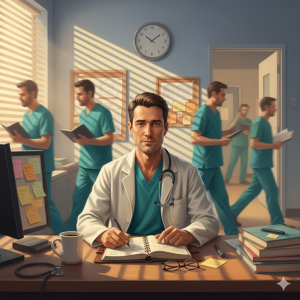
Being a Good Doctor As a Parent
The challenges of physician fatherhood and burnout. Discover how a Black doctor managed the twin pandemics of COVID-19 and systemic racism while learning that being a good doctor means not struggling alone.

The challenges of physician fatherhood and burnout. Discover how a Black doctor managed the twin pandemics of COVID-19 and systemic racism while learning that being a good doctor means not struggling alone.

Dr. Corrigan reflects on why physician burnout remains a critical issue in 2026. Drawing on research and lived experience, he explores what’s changing, what isn’t, and why connection still matters.

Happy New Year from Physicians Anonymous – some haikus from us for 2026. Enjoy, relax, and join us for our anonymous meetings!

Physicians aren’t struggling because they lack resilience. They’re burning out in a broken system. Here’s why doctors are already resilient—and what must change.

Perfectionism in medicine is often mistaken for professionalism. Dr. John explores how letting go of “perfect” helps physicians stay human…

Drowning in charts and paperwork? Read practical tips to work smarter, save time, and protect your sanity as a physician.

The challenges of physician fatherhood and burnout. Discover how a Black doctor managed the twin pandemics of COVID-19 and systemic racism while learning that being a good doctor means not struggling alone.

Dr. Corrigan reflects on why physician burnout remains a critical issue in 2026. Drawing on research and lived experience, he explores what’s changing, what isn’t, and why connection still matters.

Happy New Year from Physicians Anonymous – some haikus from us for 2026. Enjoy, relax, and join us for our anonymous meetings!

Physicians aren’t struggling because they lack resilience. They’re burning out in a broken system. Here’s why doctors are already resilient—and what must change.

Perfectionism in medicine is often mistaken for professionalism. Dr. John explores how letting go of “perfect” helps physicians stay human…

Drowning in charts and paperwork? Read practical tips to work smarter, save time, and protect your sanity as a physician.

Overwhelmed by paperwork, patients, and admin? Follow these practical strategies to survive medicine, protect your sanity, and work smarter.

ER wait times are soaring as primary care collapses. Dr. John Crosby MD explains why—and how fixing family medicine can heal healthcare in Canada and the U.S.

Private equity hospital takeovers are putting patients at risk. Learn how PE ownership leads to worse outcomes, service closures, and higher costs — and what physicians and communities can do about it.

Instead of the usual venting, sharing, and nodding in quiet solidarity, we turned the spotlight onto a book—The Art of Surrender by Dr David Hawkins.

We heal others best when we heal ourselves. The culture of self-sacrifice in medicine is killing us—and our patients. Rest isn’t lazy. It’s medicine.

Healthcare private equity consolidation promises efficiency but often leaves doctors with more admin, less autonomy, and higher burnout.

When doctors care for themselves, they care better for others. Explore the importance of self-care and well-being in the medical profession.

Has medicine lost its soul? This blog examines how commercialization and modern pressures may be reshaping the true purpose of healthcare.

Medical ethics must adapt to today’s digital world. This blog explores how technology reshapes care, privacy, and the doctor–patient relationship.